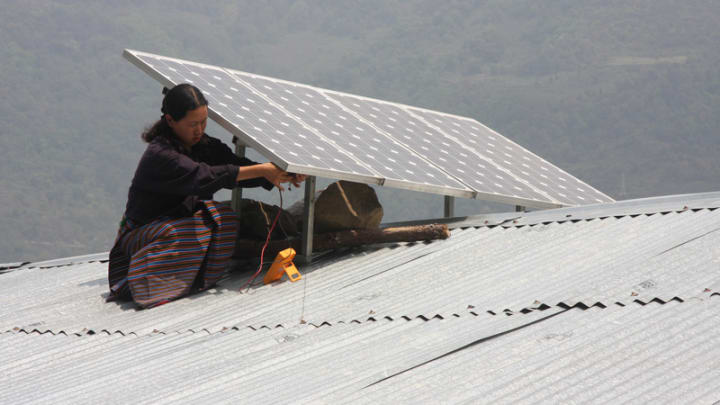
Insufficient civic engagement worldwide stands to undermine the gains of the renewable energy revolution, advocates warned this week at the Sustainable Energy for All Forum in Brooklyn, New York.
Energy is among the many policy areas that could be impacted by shrinking civic space, they said. Numerous pockets of the globe are seeing a backsliding in democratic liberties, Freedom House found in its Nations in Transit 2017 report, released this week. More than half of the Eastern European and Central Asian countries surveyed, for example, saw declines in their “Democracy Scores.”
Without citizen input and support, changes in energy use may still come — but with less efficiency and attention paid to vulnerable populations, said Manish Bapna, executive vice president and managing director of the World Resources Institute and co-chair of the Open Government Partnership.
“If we’re serious about a 100 percent renewable energy future, there needs to be broad public support for what that vision would be and what choices need to be made,” Bapna said. “At a moment when increasingly civic space is closing in so many places, those conversations become that much more difficult and that type of transformation becomes that much more difficult.”
City leaders aim to weather Trump's climate change backslide
In the age of Trump, mayors will lead on climate change action — and nations will follow, said former New York City Mayor Michael Bloomberg.
Across the forum, attendees discussed how governments, the private sector and the development community can build public support for renewable energy. In addition to engagement, they said, technology itself may soon empower consumers to take their energy futures into their own hands.
Winners and losers
The energy transition is “profoundly a political issue,” with both winners and losers, Bapna pointed out. Civil engagement can help dampen the blow or encourage transition away from powerful vested interests.
One group of potential “losers” would be the conventional fuel industry, which may use political influence to resist change. “In the absence of opening up decision-making into a more deliberative process that engages the public, it’s very hard to see how you overcome that,” Bapna said.
The other potential “losers” in an energy revolution are those people whose livelihoods depend on the status quo, or who cannot shift so easily from one system to another. The development community — and renewable energy advocates — need to extend their commitment to the vulnerable populations whose livelihoods could be impacted by a shift.
“We, the energy community [and] the sustainable development community, need to be much more serious about how to engage them as part of a fair and inclusive transition. We need to stop talking about how the death of coal is a good thing, and we need to stop talking about aggregate clean energy jobs on one hand, versus aggregate coal jobs on the other,” Bapna said.
“We need to recognize that these are individuals, households, communities, that may not easily transition to that solar or wind turbine job in another part of the country,” he added.
Leaders in change
Several countries’ experiences offer examples of how to build broad-based support for a transition to renewables. One strategy is to give people real ownership of the energy assets governments wish to promote, said Christine Lins, executive secretary of the Renewable Energy Policy Network for the 21st Century.
“Many champions of the energy transition — like Germany, for example — nearly half of the renewable electricity generation assets belong to people, are in the hands of cooperatives,” Lins said, adding that her organization is currently in discussions with the government of Mexico about how the country can better involve communities in energy planning.
Technology itself may also empower citizens to decide their energy futures, as people increasingly become both producers and consumers — or “prosumers” — of the energy they use, according to Ethan Zindler, head of Americas at Bloomberg New Energy Finance.
“There’s a certain inevitability about the ‘prosumer,’ or the ‘empowered consumer,’” he said.
For example, cheap, Chinese-manufactured solar lanterns are proliferating in unserved communities around the world.
“Better to involve [consumers] in the conversation” about renewable energy, Zindler said. “But even if you don’t, they’ll eventually become empowered, and they’ll change the world.”
Read more international development news online, and subscribe to The Development Newswire to receive the latest from the world’s leading donors and decision-makers — emailed to you free every business day.




